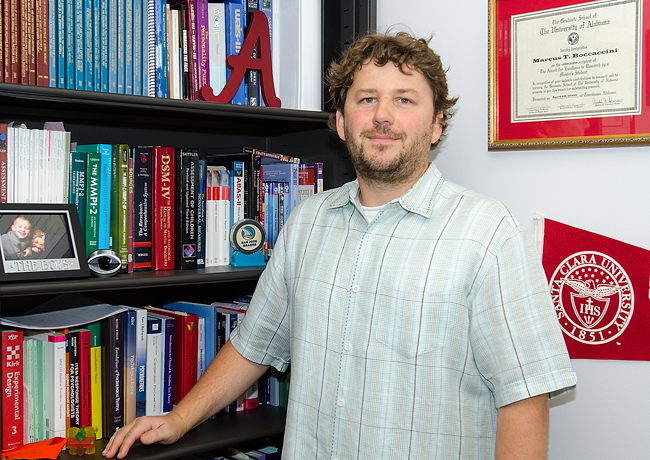Psychology Study Questions Merit Of Expert Testimony In Trials
Sept. 13, 2013
SHSU Media Contact: Jennifer Gauntt
Story By: Kim Kyle Morgan

It's been said and heard a million times: "Do the crime, do the time." But when it comes to violent sex offenders who have already completed their sentences, it's more like "you might do the crime, so do the time. Again."
That's because Texas is one of 20 states with a Sexually Violent Predator law, meaning certain sex offenders who have served their present sentence must undergo another trial by jury before being set free.
"There's a trial almost every week in Conroe," said Marcus Boccaccini, professor and associate director of clinical training in the psychology and philosophy department at Sam Houston State University.
If the offender is thought to have some sort of mental illness or behavior abnormality that makes them likely to re-offend, they can be civilly committed, Boccaccini said.
Part of the trial process requires testimony from experts. Boccaccini said psychologists and psychiatrists representing different sides—the state and the defense—present findings from standardized tests or checklists that help predict the probability of a future act of sexual violence.
"The scores on these tests should more or less be identical from both sides, but sometimes you get two very different scores," Boccaccini said. "That doesn't make sense. It's kind of like if two psychologists give a kid an IQ test; it shouldn't matter why they are giving the test or who is paying for it—the results should be similar."
But that doesn't seem to be the case when it comes to violent sexual offenders.
"We find that the state experts give different scores than the defense experts, quite consistently," Boccaccini said. "It's a pattern that is problematic. It's what we call ‘adversarial allegiance,’ although the more common term is ‘biased.’”
"(Psychology and psychiatry experts) agreed there is bias, but they believe it's someone else being biased, not them. This bias is something people have long suspected but like to think doesn't happen. Clearly, it does." —Marcus Boccaccini, |
Boccaccini, along with former SHSU colleague Daniel Murrie, set out to see if this bias is more rampant than initially thought.
"The very question 'are experts biased' is something I would have said ‘no’ to, because ethically, we are bound to be as objective as we can be," said Murrie, now a director of psychology and associate professor of psychiatry and neurobehavioral sciences at the University of Virginia School of Medicine. "Most people I know seemed to try to do that. But the more these conversations happened, the more I realized there wasn't really any good data on this. It's such an important issue but nobody had studied it."
Until now, that is.
Murrie got on board with Boccaccini, as did Lucy Guarnera from the University of Virginia, and Katrina Rufino, an SHSU doctoral student at the time.
After receiving a significant grant from the National Science Foundation, the group randomly assigned experts in psychology and psychiatry to review and score cases from Texas. Boccaccini and Murrie told experts that a Texas agency wanted to hire them as consultants to provide "second opinion" risk-measure scores.
The study took place in Virginia, with more than 100 forensic clinicians from 15 states. Some were led to believe they were consulting for the defense, others for the prosecution; but they didn't know they all received exactly the same four offender files. They were paid $400 for their time, received several hours of continuing education credit, and were led to believe that there may be additional paying work in the future.
In other words, the researchers set up the study to be as true-to-life as possible.
"We found the same pattern that we saw in the actual Texas cases," Boccaccini said. "Experts led to believe they were scoring cases for the state and being paid by the state assigned higher-risk scores than those led to believe they were scoring cases for the defense. This suggests adversarial allegiance, bias in favor of the side that's paying them for their evaluation."
So what happened when all was revealed?
"They agreed there is bias, but they believe it's someone else being biased, not them," Boccaccini said. "This bias is something people have long suspected but like to think doesn't happen. Clearly, it does."
While the findings confirmed Boccaccini and Murrie's suspicions, there isn't an answer—yet—as to what exactly triggers adversarial allegiance. Is it really just about money? Or is there some kind of subconscious psychological process going on?
"We do want to know," Boccaccini said. "But with the realities of funding, we're totally handcuffed."
Murrie hopes the success of the study, which was recently published in the prestigious journal Psychological Science, will generate more studies and perhaps answer that question.
"Research doesn't usually work out with nice, neat conclusions," Murrie said. "But this time, it did."
In the meantime, the study has begun generating a lot of interest from the media, including both science-oriented organizations, such as Science Daily and the Association for Psychological Science, and more traditional media, including the Pacific Standard and, notably, the PBS public affairs series Frontline.
“We are pleased with the coverage,” Boccaccini said. “The study had already received a good deal of attention among forensic psychologists, but the findings are applicable to any type of expert who may find him or herself in court and to people who end up in court, so we are glad to see the wider coverage.”
- END -
This page maintained by SHSU's Communications Office
Associate Director: Julia May
Manager: Jennifer Gauntt
Located in the 115 Administration Building
Telephone: 936.294.1836; Fax: 936.294.1834
Please send comments, corrections, news tips to Today@Sam.edu.

 SamWeb
SamWeb My Sam
My Sam E-mail
E-mail

